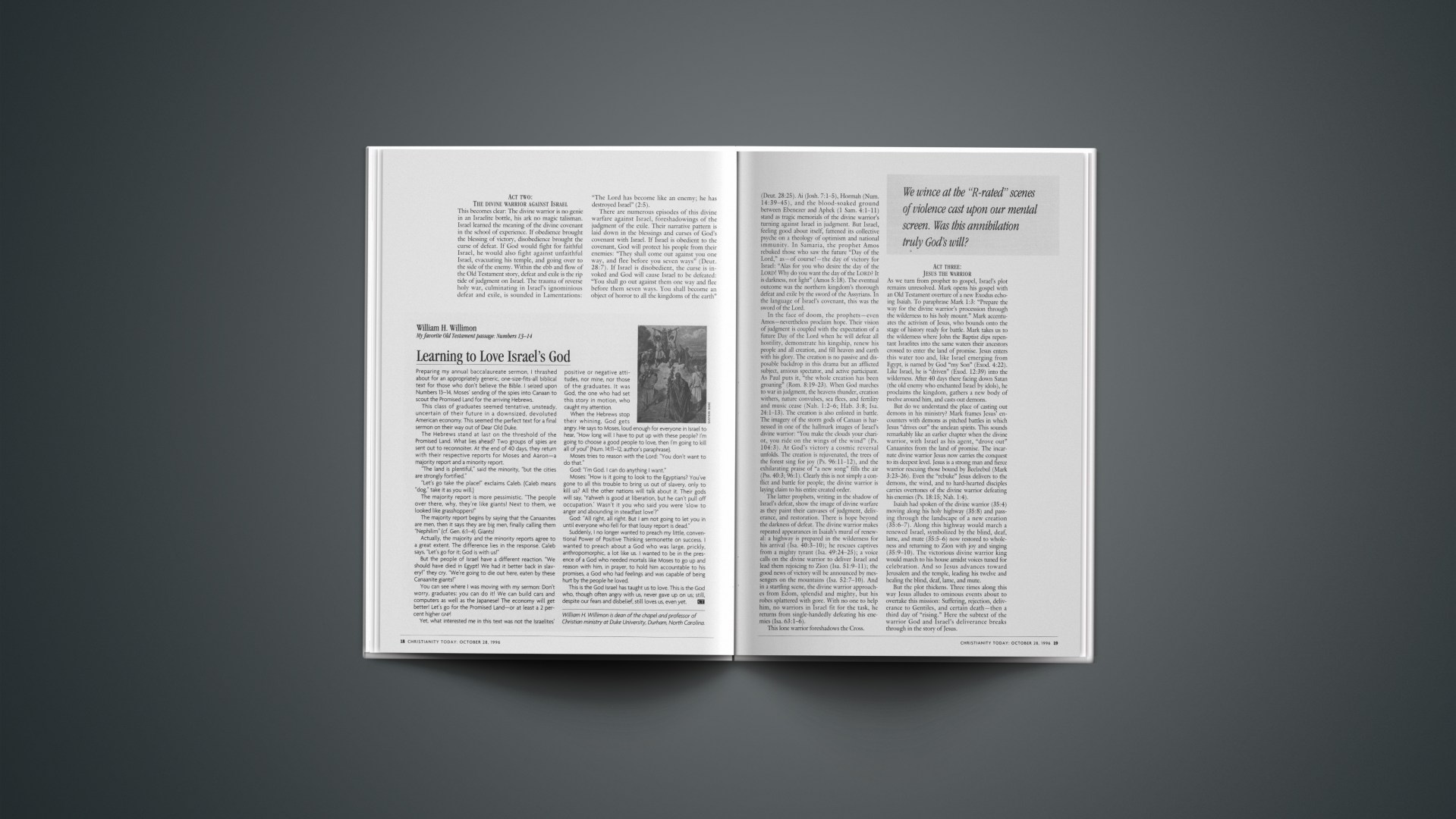Preparing my annual baccalaureate sermon, I thrashed about for an appropriately generic, one-size-fits-all biblical text for those who don't believe the Bible. I seized upon Numbers 13-14, Moses' sending of the spies into Canaan to scout the Promised Land for the arriving Hebrews.
This class of graduates seemed tentative, unsteady, uncertain of their future in a downsized, devoluted American economy. This seemed the perfect text for a final sermon on their way out of Dear Old Duke.
The Hebrews stand at last on the threshold of the Promised Land. What lies ahead? Two groups of spies are sent out to reconnoiter. At the end of 40 days, they return with their respective reports for Moses and Aaron-a majority report and a minority report.
"The land is plentiful," said the minority, "but the cities are strongly fortified."
"Let's go take the place!" exclaims Caleb. (Caleb means "dog," take it as you will.)
The majority report is more pessimistic. "The people over there, why, they're like giants! Next to them, we looked like grasshoppers!"
The majority report begins by saying that the Canaanites are men, then it says they are big men, finally calling them
"Nephilim" (cf. Gen. 6:1-4). Giants!
Actually, the majority and the minority reports agree to a great extent. The difference lies in the response. Caleb says, "Let's go for it; God is with us!"
But the people of Israel have a different reaction. "We should have died in Egypt! We had it better back in slavery!" they cry. "We're going to die out here, eaten by these Canaanite giants!"
You can see where I was moving with my sermon: Don't worry, graduates: you can do it! We can build cars and computers as well as the Japanese! The economy will get better! Let's go for the Promised Land-or at least a 2 percent higher GNP!
Yet, what interested me in this text was not the Israelites' positive or negative attitudes, nor mine, nor those of the graduates. It was God, the one who had set this story in motion, who caught my attention.
When the Hebrews stop their whining, God gets angry. He says to Moses, loud enough for everyone in Israel to hear, "How long will I have to put up with these people? I'm going to choose a good people to love, then I'm going to kill all of you!" (Num. 14:11-12, author's paraphrase).
Moses tries to reason with the Lord: "You don't want to do that."
God: "I'm God. I can do anything I want."
Moses: "How is it going to look to the Egyptians? You've gone to all this trouble to bring us out of slavery, only to kill us? All the other nations will talk about it. Their gods will say, 'Yahweh is good at liberation, but he can't pull off occupation.' Wasn't it you who said you were 'slow to anger and abounding in steadfast love'?"
God: "All right, all right. But I am not going to let you in until everyone who fell for that lousy report is dead."
Suddenly, I no longer wanted to preach my little, conventional Power of Positive Thinking sermonette on success. I wanted to preach about a God who was large, prickly, anthropomorphic, a lot like us. I wanted to be in the presence of a God who needed mortals like Moses to go up and reason with him, in prayer, to hold him accountable to his promises, a God who had feelings and was capable of being hurt by the people he loved.
This is the God Israel has taught us to love. This is the God who, though often angry with us, never gave up on us; still, despite our fears and disbelief, still loves us, even yet.
William H. Willimon is dean of the chapel and professor of Christian ministry at Duke University, Durham, North Carolina.










